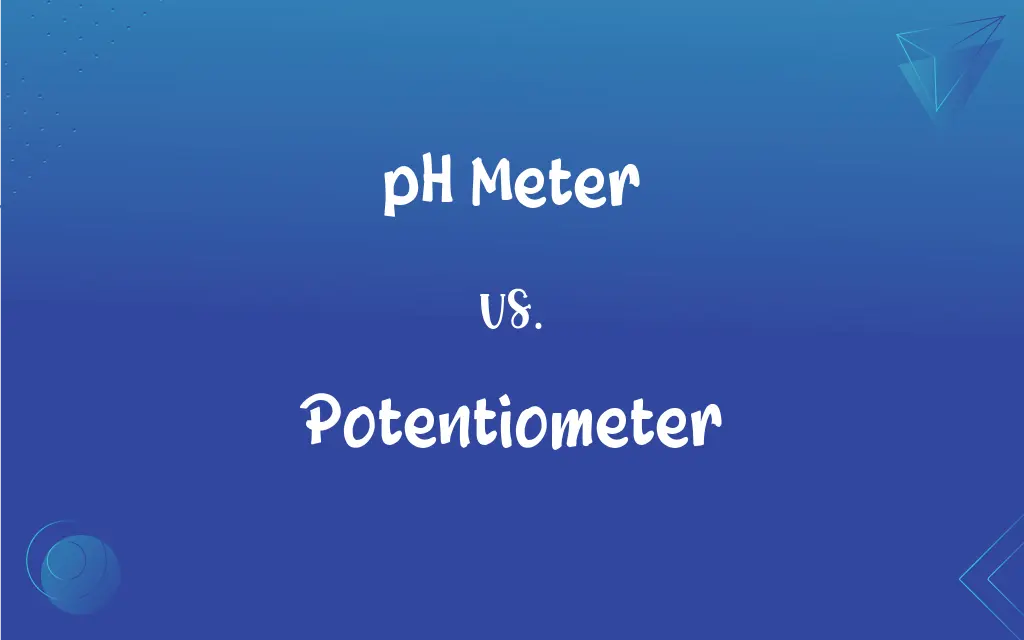pH Meter vs. Potentiometer: What's the Difference?
Edited by Aimie Carlson || By Janet White || Published on October 10, 2024
A pH meter measures the acidity or alkalinity of a solution, while a potentiometer measures electric potential or adjusts voltage in a circuit.

Key Differences
A pH meter is a specialized instrument designed to measure the hydrogen-ion activity in solutions, quantitatively expressing its acidity or alkalinity on the pH scale. This device is crucial in various scientific, industrial, and culinary applications where precise pH levels are necessary for quality control, chemical reactions, or taste. A potentiometer, in contrast, serves a different function. It is an electrical component that varies the resistance within a circuit, either to adjust the volume on an audio device or to measure the voltage or electric potential difference in a circuit, showcasing its versatility in electronics.
The operational principles of a pH meter and a potentiometer highlight their distinct applications. A pH meter works by measuring the voltage difference between two electrodes placed in the solution, translating this electrical signal into a pH value. This method is specific to analyzing the chemical nature of solutions. On the other hand, a potentiometer operates by manually or electronically adjusting the resistance in a circuit, which can control the output signal or measure electrical parameters, indicating its electrical rather than chemical focus.
From a usage perspective, the pH meter is indispensable in laboratories, water treatment facilities, and the food industry, where monitoring and adjusting the pH is essential for safety, compliance, and quality. Potentiometers find their application in a broader range of electronic devices, from controlling the volume on radios and televisions to functioning as position sensors in joysticks or as variable power supplies in circuits, highlighting their adaptability in the electrical domain.
Regarding their construction, pH meters typically consist of a glass electrode, a reference electrode, and a digital display to report pH levels, requiring calibration with standard buffers for accurate measurements. Potentiometers, however, are constructed as variable resistors with a sliding or rotating contact that sweeps over a resistive element, allowing for the adjustment of circuit elements or the measurement of electrical potentials, reflecting their mechanical and electrical design elements.
The technological advancements in both fields have led to the development of more sophisticated and application-specific versions of each instrument. Digital pH meters now offer features like automatic temperature compensation, data logging, and wireless connectivity for enhanced accuracy and convenience. Similarly, potentiometers have evolved into digital versions, like the digital potentiometer or "digipot," offering precision control in electronic circuits through digital signals, showcasing the ongoing innovation in both chemical and electrical measurement tools.
ADVERTISEMENT
Comparison Chart
Function
Measures acidity or alkalinity (pH levels)
Adjusts voltage or measures electric potential
Application
Chemical analysis in labs, industry
Volume control, voltage adjustment in circuits
Operational Basis
Voltage difference between electrodes
Variable resistance in a circuit
Use Case
Lab testing, water quality, food safety
Electronics, audio devices, sensors
Technology
Electrodes and digital displays
Mechanical adjustment or digital control
ADVERTISEMENT
pH Meter and Potentiometer Definitions
pH Meter
Incorporates electrodes for accurate and rapid pH measurement.
With a pH meter, the chemist quickly adjusted the solution's pH to the desired level.
Potentiometer
Serves as a volume control in audio devices.
Turning the potentiometer increased the stereo system's volume.
pH Meter
An instrument that quantifies the hydrogen ion concentration.
Adjusting the soil's pH with a pH meter improved plant health significantly.
Potentiometer
An electrical component for measuring voltage differences.
The technician used a potentiometer to calibrate the equipment's sensitivity.
pH Meter
A tool for precise pH level analysis in various applications.
The brewery relies on a pH meter to maintain the consistency of its beers.
Potentiometer
Acts as a position sensor in various controls.
The game controller's joystick uses a potentiometer to detect movements.
pH Meter
A device for measuring the acidity or alkalinity of solutions.
The lab technician used a pH meter to ensure the swimming pool water was safe.
Potentiometer
A variable resistor used to adjust voltage in electronic circuits.
He adjusted the potentiometer to control the brightness of the LED.
pH Meter
Essential for monitoring pH in environmental, food, and research settings.
Environmental scientists use a pH meter to assess lake water quality.
Potentiometer
Can be digital or analog, suited for precise electronic adjustments.
A digital potentiometer provides accurate control over the circuit's parameters.
Potentiometer
A three-terminal resistor with a manually adjustable center connection that adjusts the resistance between the end terminals and the center, whose uses include controlling the volume of an amplifier. Also called pot3.
FAQs
What types of potentiometers are there?
Rotary, linear, and digital (digipot).
What does a pH meter measure?
Measures the acidity or alkalinity of a solution.
Can a pH meter be used for any liquid?
Yes, for most aqueous solutions, but calibration is essential for accuracy.
Are pH meters accurate?
Highly accurate when properly calibrated and maintained.
What is the primary use of a potentiometer?
To adjust voltage or as a variable resistor in circuits.
What is the importance of pH measurement?
Critical for chemical processes, environmental monitoring, and food safety.
Can potentiometers measure voltage?
Yes, especially when used as a component in a measuring instrument.
How does a pH meter work?
By measuring the voltage difference between two electrodes.
How to maintain a pH meter?
Regular cleaning, storage in proper solution, and calibration.
Do pH meters need calibration?
Yes, regularly with standard buffer solutions.
What applications require a potentiometer?
Electronics, audio devices, and control systems.
What affects a potentiometer's performance?
Wear and tear, dust, and quality of materials.
Is there a digital version of potentiometers?
Yes, digital potentiometers offer precise electronic adjustment.
What's the difference between a slider and a rotary potentiometer?
The method of adjustment: sliding versus rotating.
What factors affect potentiometer accuracy?
Quality of the wiper contact, resistance stability, and mechanical precision.
How does temperature affect pH measurements?
pH can change with temperature; some meters have automatic compensation.
Why use a potentiometer instead of a switch?
For variable control over voltage or resistance, not just on/off states.
Can pH meters measure gas pH levels?
Not directly; gases must be dissolved in a liquid.
How long do pH meters last?
Several years with proper care and maintenance.
Can I use a pH meter for soil testing?
Yes, but the soil must be mixed with water or a special solution.
About Author
Written by
Janet WhiteJanet White has been an esteemed writer and blogger for Difference Wiki. Holding a Master's degree in Science and Medical Journalism from the prestigious Boston University, she has consistently demonstrated her expertise and passion for her field. When she's not immersed in her work, Janet relishes her time exercising, delving into a good book, and cherishing moments with friends and family.
Edited by
Aimie CarlsonAimie Carlson, holding a master's degree in English literature, is a fervent English language enthusiast. She lends her writing talents to Difference Wiki, a prominent website that specializes in comparisons, offering readers insightful analyses that both captivate and inform.






































































